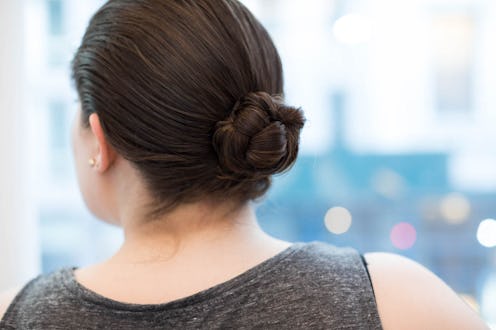Life
A New Report Reveals Why Half Of Young People Aren't Getting Care For Their Mental Health

Open dialogues about mental health and wellness are more common now than ever before. But while a new report from Born This Way Foundation reveals that while nearly 90 percent of young people prioritize their mental health and 80 percent want to learn coping skills, 50 percent don't know where to access mental health support, and only 40 percent rate their mental health highly. The Born This Way Foundation worked with Benenson Strategy Group to survey more than 2,000 people ages 13 to 24 across the country for its report, "Youth Mental Health In America: Understanding Resource Availability And Preferences."
"This survey is a clear and urgent demonstration that young people care about their mental health but they are struggling. They want to learn skills, access tools, and find services that would help them cope with the very real challenges they face but don’t know where to turn — and that has to change," Cynthia Germanotta, co-founder and president of Born This Way Foundation, said in a press release.
If you've tried to access mental health resources, then you know it can be a frustrating game of musical chairs in order find providers that take your insurance. If you don't have health insurance, the out-of-pocket cost for mental health services might not be in your budget, and you're not alone. The report stated that cost was a significant barrier to mental health treatment for 40 percent people of under 24.
Over the past month, 60 percent of respondents ages 18 to 24 reported feeling stressed, 40 percent reported feeling helpless or sad, and 34 percent said they felt fearful a good portion of the time. Those numbers were even higher for transgender and non-binary people. What's more, the LGBTQ community reported at a much higher rate than non-LGBTQ respondents that mental health services weren't available to them.
Despite the fact that conversations about mental health are more common today than they ever have been, the report found that only 15 percent of young people said they discuss their mental health often, and 49 percent said they rarely or never discuss their mental health. The report stated that these findings demonstrate the need for actively modeling and supporting mental health conversations. This includes conversations about how and where to access mental health services, including support groups, online forums, college campus resources, apps, and low-cost, in-person mental health care.
"Young people need and deserve resources that can not only help them navigate potentially life-threatening situations but can help them address mental health challenges before they become crises. We can and must do more to bridge this gap and equip young people with the supports they need to live healthy, thriving lives," Germanotta said.
The survey found that those who discussed their mental health openly felt better than those who didn't. One woman is quoted as saying, "It's important to discuss your mental health. Discussing it helps you process what you are feeling." According to the American Psychological Association, talking with a therapist can go a long way toward helping you feel better. "Grounded in dialogue, [therapy] provides a supportive environment that allows you to talk openly with someone who’s objective, neutral, and nonjudgmental."
While talking with any non-judgmental person can help, the APA recommended seeking talk therapy from a licensed professional if you feel an overwhelming, prolonged sense of hopelessness and sadness; you find it difficult to concentrate or perform daily tasks; you worry excessively and feel on edge more often than not; or you're using alcohol, drugs, or engaging in other risky behaviors in order to cope.
If you don't have health insurance, and you're not sure where to turn for mental health care, you can go to the website Low Cost Help and search for free and reduced-cost options by city and state. If you need help paying for prescriptions, you can get a free prescription discount card online that can significantly lower out-of-pocket costs. In addition, online therapy and therapy apps are generally cheaper than in-person therapy, though they're not for everyone.
It can be difficult to ask for and find help, but you are 100 percent worth it. Everyone deserves mental health care, and we're all in this together.
If you or someone you know is seeking help for mental health concerns, visit the National Alliance on Mental Health (NAMI) website, or call 1-800-950-NAMI(6264). For confidential treatment referrals, visit the Substance Abuse and Mental Health Services Administration (SAMHSA) website, or call the National Helpline at 1-800-662-HELP(4357). In an emergency, contact the National Suicide Prevention Lifeline at 1-800-273-TALK(8255), or call 911.